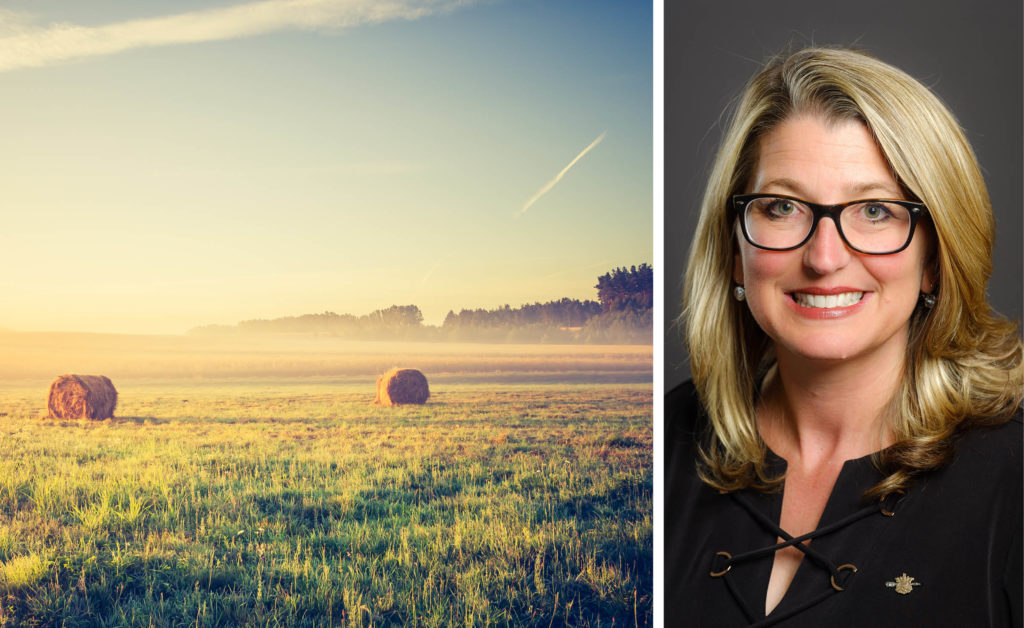by Jo Barnes | photo of Lana courtesy Ministry of Agriculture, Food and Fisheries –
What would you say is an important feature of the Saanich Peninsula? Some say downtown Sidney or perhaps the airport. Still others would cite the ferry terminal.
But there is one feature that we might overlook which has come into the spotlight due to the current pandemic: our many and varied local farms.
Our farms are not only integral to our food security, but they are also key to environmental sustainability and by extension our very health.
I recently interviewed local MLA and Minister of Agriculture (at left), Food and Fisheries, the Honourable Lana Popham, for her views on farming and its future.
“With Covid, there was enthusiastic shopping that threw the food industry into disarray,” shares Minister Popham. “But the silver lining in it all was that people became aware of the importance of the food industry and food security.”
Over recent years, there has been a growing interest in local B.C. food. Consumers have purchased local products from farmer’s markets and specialty stores, all of which support and strengthen the local economy. The pandemic shone a light on the importance of a safe and resilient food system here in our province.
“Before Covid, my focus was on the need for stabilizing our domestic market,” says Minister Popham. “When I was first in the Ministry I was always using the word resiliency. Now it’s the most common word at the forefront. The concept of being more resilient has a higher profile.”
The words resilient and farmer of course go hand in hand. Regular readers of this farming series will have seen this time and again. Long hours, significant physical efforts, ingenuity, adaptability and persistence are all required when it comes to tending the land and harvesting its riches. Yet this new awareness of the importance of growing food and sustaining that ability is gaining traction and capturing attention of a wider demographic.
“There is a food renaissance right now. When I travel around the province, I run into young people who are interested in farming. They have grown up in cities and want to get back to the land,” shares Minister Popham. “Also, I meet women in the 30 to 40 age bracket who are educated, have finished having kids, and want to be a part of something they believe in.”
The Ministry of Agriculture, Food and Fisheries is responding to this keen interest with programs and initiatives. First, the BC Land Matching Program, delivered through Young Agrarians, connects interested farmers with landowners. Starting a new farm can be prohibitively expensive due to the high cost of land. Through this program new farmers can find a property, negotiate a lease agreement with the landowner, as well as get help with a business plan, resources and technical services.
“Since we formalized the land matching program, the number of acres now in production is significant,” comments Minister Popham.
Then there is the Small Farm Business Acceleration Pilot Program, which offers funding up to $800,000 for business plan coaching for small and new farmers and cost-shared funding for commercial farm infrastructure and equipment. As small-scale farm operations are foundational to the local food economy, this program is significant.
To increase the competitiveness of B.C.’s raspberry industry in markets both local and global, the province launched a new $90,000 Raspberry Replant Program. Another area of focus is Bee BC Grants, which support small scale, community-based projects to research and share information about bee health.
“Bees are so important to us. The Ministry heavily supports bee keepers and work associated with bee health through our Bee BC Program,” says Minister Popham.
No matter the initiative or program, the recurring objectives are always those of farming sustainability, future food security and environmental stewardship. In 2021, the Ministry will invest another $800,000 in the Beneficial Management Practices Program which provides funding to farmers who take on projects for a cleaner and healthier environment. Examples might be waste management, enhancing air quality, improving soil nutrients or irrigation management. The Ministry’s Regenerative Agricultural Network will bring together the traditional production systems such as crop rotation, crop cover and no-till techniques with newer agri-technologies like robotics or precision farming.
“By bringing the old ways of growing with cutting edge technology, this will all help with climate change and its impact,” shares Minister Popham.
The Minister summed up the government’s efforts by adding: “The government is the wind at the back of people wanting to do the work of farming.”
The Saanich Peninsula has featured farms for over a hundred years. Some are easily seen from the highway; others are tucked quietly away behind hedges or fencing. All of these farms, however, not only provide sustenance, but they represent the future sustainability of our communities.




